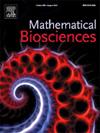竞争和表型可塑性对适应性治疗生存能力的影响。
IF 1.8
4区 数学
Q2 BIOLOGY
引用次数: 0
摘要
癌症是异质性的,药物敏感性的变化在不同类型的癌症中被广泛记录。适应性治疗是一种新兴的治疗策略,利用这种异质性来改善治疗结果。目前的标准治疗消除了大多数药物敏感细胞,导致竞争性释放复发。适应性治疗保留了一些药物敏感细胞,通过生态竞争限制了耐药细胞的生长。这种策略已经显示出一些早期的希望,但目前的方法很大程度上假设细胞表型保持不变,即使细胞状态的转变可能允许药物敏感和耐药表型的交换,从而逃避治疗。我们使用种群增长的确定性模型来解决这一差距,其中敏感和抗性细胞在竞争下生长并经历细胞状态转变。该模型的稳态行为和时间动力学确定了适合于有效自适应治疗和恒剂量治疗的竞争和过渡的最佳平衡。此外,在适应性治疗下,具有细胞状态转换的模型比没有的模型显示出更慢的振荡,这表明竞争-转换平衡可能会影响种群水平的动态特性。我们的分析还确定了现象学模型在治疗设计和实施方面的关键局限性,特别是在细胞状态转换方面。这些发现阐明了表型可塑性与新兴癌症治疗策略的相关性,使用种群动态作为调查框架。本文章由计算机程序翻译,如有差异,请以英文原文为准。
Impacts of competition and phenotypic plasticity on the viability of adaptive therapy
Cancer is heterogeneous and variability in drug sensitivity is widely documented across cancer types. Adaptive therapy is an emerging treatment strategy that leverages this heterogeneity to improve therapeutic outcomes. Current standard treatments eliminate a majority of drug-sensitive cells, leading to relapse by competitive release. Adaptive therapy retains some drug-sensitive cells, limiting resistant cell growth by ecological competition. This strategy has shown some early promise, but current methods largely assume cell phenotypes to remain constant, even though cell-state transitions could permit drug-sensitive and -resistant phenotypes to interchange and thus escape therapy. We address this gap using a deterministic model of population growth, in which sensitive and resistant cells grow under competition and undergo cell-state transitions. The model’s steady-state behaviour and temporal dynamics identify optimal balances of competition and transitions suitable for effective adaptive versus constant dose therapy. Furthermore, under adaptive therapy, models with cell-state transitions show slower oscillations than those without, suggesting that the competition-transitions balance could impinge on population-level dynamical properties. Our analyses also identify key limitations of phenomenological models in therapy design and implementation, particularly with cell-state transitions. These findings elucidate the relevance of phenotypic plasticity for emerging cancer treatment strategies using population dynamics as an investigation framework.
求助全文
通过发布文献求助,成功后即可免费获取论文全文。
去求助
来源期刊

Mathematical Biosciences
生物-生物学
CiteScore
7.50
自引率
2.30%
发文量
67
审稿时长
18 days
期刊介绍:
Mathematical Biosciences publishes work providing new concepts or new understanding of biological systems using mathematical models, or methodological articles likely to find application to multiple biological systems. Papers are expected to present a major research finding of broad significance for the biological sciences, or mathematical biology. Mathematical Biosciences welcomes original research articles, letters, reviews and perspectives.
 求助内容:
求助内容: 应助结果提醒方式:
应助结果提醒方式:


